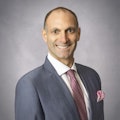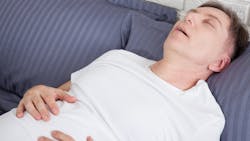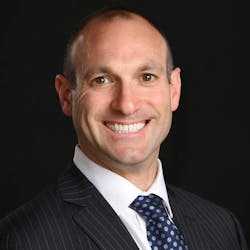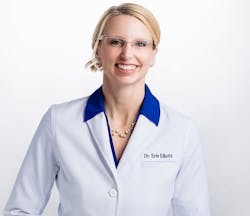Results of a large international study show stroke risk was more than three times higher in those who slept too little (less than five hours), more than twice as high in those who sleep too much (more than nine hours), and two to three times higher in those with symptoms of severe obstructive sleep apnea (OSA).1,2 The study also showed that the greater the number of sleep disorder symptoms, the greater the risk for stroke. In fact, participants with five or more sleep disordered symptoms had a five times greater risk for stroke.
Overall, 4,496 matched participants were included, with 1,799 of them having experienced an ischemic stroke and 439 an intracerebral hemorrhage. The increase in risk for stroke compared to normal sleep (defined as seven to nine hours) is shown here:
Sleep disorders: Stroke risk increase relative to normal sleep
- Short sleep (less than five hours): 3.2x
- Long sleep (more than nine hours): 2.7x
- Impaired quality: 1.5x
- Difficulty getting to sleep or maintaining sleep: 1.3x
- Unplanned napping/prolonged napping (more than one hour): 1.6–1.9x
- Snoring: 1.9x
- Snorting: 2.6x
- Breathing cessation: 2.9x
- Obstructive sleep apnea (OSA score of 2–3): 2.7x
- Cumulative sleep symptoms of five or more: 5x
One limitation of the study was that data on sleep was collected only at one point; participants were not followed over time to see if changes in sleep affected stroke risk. Although the study data did not show a causal link between disordered sleep and stroke, the association between the two was strong. Previous research conducted with 125 subjects is in accordance with this new study data and showed severe OSA doubles the risk of stroke3 and increases the chance of recurrent stroke.4
You may also be interested in … Sleep medicine: Why you should be involved with it
Why should this matter to dental professionals?
The authors of the study concluded that collecting information about sleep using a validated assessment tool is an important piece of clinical care, especially among patients with other risk factors for stroke.
How does this affect us in dentistry? The role that dentists can play in screening and treating sleep disorders is an important one in the prevention of potential stroke. We have an established relationship with our patients and see them more often than primary care providers. We have their health history at our fingertips and can ask questions about their sleep symptoms to help connect the dots for patients.
More about dental sleep medicine ... Is the buzz with dental sleep medicine loud enough?
Dental professionals are preventive minded, while many cardiologists and neurologists must be reactive in their care. As health-care professionals, we are equipped to help manage patients who have mild to moderate sleep apnea. Across the US, there is a marked shortage of sleep medicine physicians, with an estimated patient-to-physician ratio of 43,000:1.5
The sleep profession needs our help so that 80%–90% of patients with sleep apnea don’t continue to go undiagnosed and suffer any longer while putting their health at risk.6 Let’s continue to help our patients prevent potentially life-altering incidences and continue to treat the whole body, knowing that the mouth has a systemic connection.
So, what can you do now?
Get trained. Bring your team to the training so that everyone can learn what to look for, how to screen patients, and how to treat them.
Editor’s note: This article originally appeared in Perio-Implant Advisory, a chairside resource for dentists and hygienists that focuses on periodontal- and implant-related issues. Read more articles and subscribe to the newsletter.
References
- Mc Carthy CE, Yusuf S, Judge C, et al. Sleep patterns and the risk of acute stroke: results from the INTERSTROKE International Case-Control Study. Neurology. 2023;100(21):e2191-e2203. doi:10.1212/WNL.0000000000207249
- Wickramasinghe H, Rowley JA. Obstructive sleep apnea (OSA). Medscape. Updated September 15, 2020. https://emedicine.medscape.com/article/295807-overview
- Splete H. Severe OSA tied to poor prognoses in stoke patients. Medscape. December 16, 2022. https://www.medscape.com/viewarticle/985721
- Xu J, Wang J, Wu H, et al. Effects of severe obstructive sleep apnea on functional prognosis in the acute phase of ischemic stroke and quantitative electroencephalographic markers. Sleep Med. 2023;101:452-460. doi:10.1016/j.sleep.2022.11.035
- Watson NF, Rosen IM, Chervin RD, Board of Directors of the American Academy of Sleep Medicine. The past is prologue: the future of sleep medicine. J Clin Sleep Med. 2017;13(1):127-135. doi:10.5664/jcsm.6406
- Chen L, Pivetta B, Nagappa M, et al. Validation of the STOP-Bang questionnaire for screening of obstructive sleep apnea in the general population and commercial drivers: a systematic review and meta-analysis. Sleep Breath. 2021;25(4):1741-1751. doi:10.1007/s11325-021-02299-y
About the Author

Scott Froum, DDS
Editorial Director
Scott Froum, DDS, a graduate of the State University of New York, Stony Brook School of Dental Medicine, is a periodontist in private practice at 1110 2nd Avenue, Suite 305, New York City, New York. He is the editorial director of Perio-Implant Advisory and serves on the editorial advisory board of Dental Economics. Dr. Froum, a diplomate of both the American Academy of Periodontology and the American Academy of Osseointegration, is in the fellowship program at the American Academy of Anti-aging Medicine, and is a volunteer professor in the postgraduate periodontal program at SUNY Stony Brook School of Dental Medicine. He is a trained naturopath and is the scientific director of Meraki Integrative Functional Wellness Center. Contact him through his website at drscottfroum.com or (212) 751-8530.


